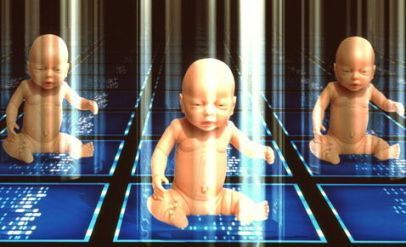獲得今年諾貝爾醫(yī)學獎的英國科學家約翰?格登爵士表示,未來50年內(nèi),那些在意外中失去孩子的父母將有可能通過克隆技術(shù)得到孩子的“復制品”。格登爵士指出,雖然克隆人類可能會引發(fā)一系列復雜的道德爭議,不過一旦該技術(shù)在醫(yī)學領(lǐng)域廣施拳腳,人們的擔憂就會慢慢消失。他舉例指出,試管嬰兒技術(shù)在最初研發(fā)時也廣受質(zhì)疑,但1978年第一個試管嬰兒出生以后就被人們廣泛接受了。不過,他也表示,克隆技術(shù)用于人類之前還需要有大量改進,因為目前大部分克隆的動物胚胎都還是畸形。

 |
|
Parents who lose children in accidents may be able to clone "copies" to replace them within 50 years, a British scientist who won this year's Nobel prize for medicine has predicted. |
Parents who lose children in accidents may be able to clone "copies" to replace them within 50 years, a British scientist who won this year's Nobel prize for medicine has predicted.
Sir John Gurdon, whose work cloning frogs in the 1950s and 60s led to the later creation of Dolly the sheep by Edinburgh scientists in 1996, said that progression to human cloning could happen within half a century.
Although any attempt to clone an entire human would raise a host of complex ethical issues, the biologist claimed people would soon overcome their concerns if the technique became medically useful.
In-vitro fertilization was regarded with extreme suspicion when it was first developed but became widely accepted after the birth of Louise Brown, the first "test tube baby", in 1978, he explained.
Major improvements in cloning methods would have to be made before they could be applied to humans because the vast majority of cloned animal embryos today are deformed, he added.
Speaking on BBC Radio Four's The Life Scientific, Sir John said he had predicted at the time of his frog experiments that the successful cloning of a mammal would happen within 50 years, and that "maybe the same answer is appropriate" for the step to human cloning.
He said: "When my first frog experiments were done an eminent American reporter came down and said 'How long will it be before these things can be done in mammals or humans?'
"I said: 'Well, it could be anywhere between 10 years and 100 years – how about 50 years? It turned out that wasn't far off the mark as far as Dolly was concerned. Maybe the same answer is appropriate."
Sir John added that cloning a human being effectively means making an identical twin, and doctors would therefore simply be "copying what nature has already produced".
He said: "I take the view that anything you can do to relieve suffering or improve human health will usually be widely accepted by the public – that is to say if cloning actually turned out to be solving some problems and was useful to people, I think it would be accepted."
During public lectures the Cambridge University scientist said he regularly asks his audience if they would be in favor of allowing parents of deceased children, who are no longer fertile, to create another using the mother's eggs and skin cells from the first child, assuming the technique was safe and effective.
"The average vote on that is 60 per cent in favor," he said. "The reasons for 'no' are usually that the new child would feel they were some sort of a replacement for something and not valid in their own right.
"But if the mother and father, if relevant, want to follow that route, why should you or I stop them?"
相關(guān)閱讀
(Agencies)

(中國日報網(wǎng)英語點津 Helen )
